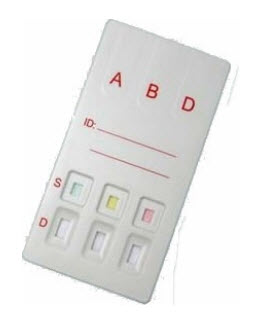Blood typing plays a crucial role in healthcare, with the ABO and RhD systems being fundamental to understanding and managing various clinical situations. In this article, we’ll explore the implications of ABO and RhD blood typing variations, focusing on clinical considerations and the pivotal role of ABO & RhD rapid tests in addressing these challenges.
Introduction
Blood typing, specifically ABO and RhD, is essential for healthcare practitioners to ensure patient safety and optimal clinical outcomes. ABO blood typing categorizes blood into four groups – A, B, AB, and O – while RhD blood typing determines the presence or absence of the RhD antigen. Understanding these blood types is crucial for medical interventions, such as blood transfusions, organ transplants, and managing pregnancies.
Understanding ABO Blood Typing
ABO blood typing is based on the presence or absence of antigens on the surface of red blood cells. Individuals with type A blood have A antigens, type B have B antigens, type AB has both A and B antigens, and type O has neither. The compatibility of blood types is critical, especially in blood transfusions, where mismatching can lead to severe complications, including life-threatening reactions.
RhD Blood Typing
RhD typing determines the presence or absence of the RhD antigen, commonly known as the Rh factor. Individuals who have this antigen are RhD positive, while those without it are RhD negative. This classification is particularly significant during pregnancy, as RhD incompatibility between the mother and the baby can lead to complications.
Variations in ABO and RhD Blood Typing
Despite the standardized ABO and RhD systems, variations exist due to genetic factors. Understanding these variations is crucial for accurate blood typing and avoiding complications in medical procedures. Variations may influence the compatibility of blood for transfusions or impact the health of a developing fetus.
Clinical Considerations
In clinical settings, ABO and RhD blood typing are paramount in determining organ transplant compatibility. The success of organ transplants relies heavily on matching blood types to minimize the risk of rejection. Similarly, bone marrow transplants require precise matching to ensure a positive outcome for the recipient.

Role of ABO & RhD Rapid Test
The emergence of ABO & RhD rapid tests has revolutionized blood typing, providing quick and reliable results in emergency situations. These tests are especially valuable in critical care scenarios where immediate blood typing is necessary for prompt medical interventions.
Accuracy and Reliability
While rapid tests offer quick results, questions about their accuracy persist. It’s essential to assess the reliability of ABO RhD blood tests compared to traditional laboratory methods. Understanding the limitations and advantages of these tests is crucial for healthcare professionals relying on rapid blood typing in urgent situations.
Application in Pregnancy
ABO and RhD typing assume particular importance during pregnancy. RhD incompatibility between the mother and the fetus can lead to hemolytic disease of the newborn (HDN). Proper blood typing and monitoring during pregnancy are vital to anticipate and manage potential complications for both the mother and the baby.
Blood Transfusions and ABO Compatibility
Ensuring ABO compatibility in blood transfusions is a fundamental aspect of patient safety. Mismatched blood transfusions can result in severe reactions, ranging from fever and chills to life-threatening hemolytic reactions. Healthcare providers must meticulously match blood types to avoid adverse outcomes.
Genetic Factors Influencing Blood Typing
While ABO and RhD systems are well-defined, genetic factors can influence blood typing. Understanding inherited variations is crucial for accurate blood typing and predicting potential challenges in medical procedures that rely on precise blood compatibility.

Advancements in Blood Typing Technology
Technological advancements have significantly improved blood typing accuracy. Molecular techniques, such as PCR-based methods, offer enhanced precision in determining blood types. Staying updated on these innovations is essential for healthcare professionals seeking the most accurate and reliable blood typing methods.
Challenges in Blood Typing
Despite advancements, challenges persist in achieving accurate blood typing. Factors such as mixed-field agglutination and weak or variant antigen expression pose difficulties in determining blood types. Ongoing research aims to address these challenges and enhance the reliability of blood typing methods.
Global Significance of Blood Typing
The implications of ABO and RhD blood typing extend globally, affecting healthcare practices in diverse regions. Understanding these blood typing systems is crucial for addressing healthcare disparities and ensuring access to accurate blood typing resources worldwide.
Educational Initiatives and Awareness
Promoting public awareness about the significance of blood typing is essential. Educational initiatives can empower individuals to know their blood types, fostering a sense of responsibility for their health. Increased awareness also contributes to better-informed decisions in emergency situations.
Conclusion
In conclusion, the implications of ABO and RhD blood typing variations are far-reaching, influencing various aspects of clinical practice and patient care. The role of ABO & RhD rapid tests is pivotal in addressing the challenges posed by variations and ensuring timely and accurate blood typing, particularly in critical situations. Healthcare professionals and the public alike must recognize the importance of understanding blood types for improved healthcare outcomes.
Frequently Asked Questions About ABO & RHD Rapid Test
Q1: Why is ABO and RhD blood typing essential in healthcare?
ABO and RhD blood typing is crucial for ensuring safe blood transfusions, organ transplants, and managing pregnancies, minimizing the risk of complications.
Q2: How do ABO & RhD rapid tests compare to traditional laboratory methods?
Rapid tests provide quick results in emergency situations, but their accuracy should be assessed in comparison to traditional laboratory methods.
Q3: What challenges are faced in achieving accurate blood typing?
Challenges include mixed-field agglutination and variant antigen expression, driving ongoing research to improve blood typing reliability.
Q4: How does genetic variability impact ABO and RhD blood typing?
Genetic factors can introduce variations, influencing blood typing and necessitating a nuanced understanding of inherited factors.
Q5: What is the global significance of ABO and RhD blood typing?
Blood typing has global implications, addressing healthcare disparities and ensuring access to accurate blood typing resources worldwide.

